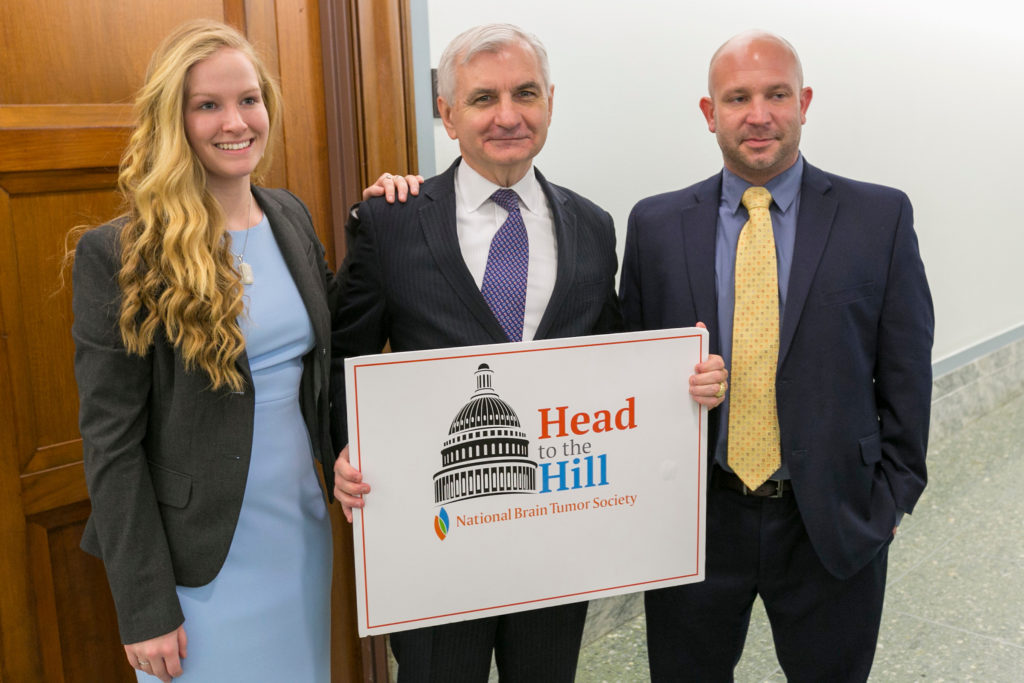Below are highlights of news and developments in brain tumor advocacy and public policy compiled by NBTS Research & Advocacy Manager Kacey Troy Ribnik and Director of Advocacy Lainey Titus Samant:
New Increases for Medical Research Funding
Congress recently passed a Fiscal Year 2019 (FY19) spending bill that includes increased funding for medical research. This action continues a bipartisan commitment to increase the amount of budget money available for researchers each year to fight diseases such as brain tumors. The President signed the bill into law late last week, guaranteeing that the funding was available at the start of the new fiscal year (October 1, 2018).
This appropriations bill is proof that your advocacy works. It includes:
- $30 million in funding for the Childhood Cancer STAR Act, which was passed earlier this year. The STAR Act is the most comprehensive childhood cancer bill ever passed. This funding will guarantee that the programs authorized by the STAR Act will be implemented and begin to make a difference for all those affected by childhood cancer.
- A $2 billion (5.4%) increase for the National Institutes of Health (NIH), bringing total funding to $39.084 billion, which includes funding for 21st Century Cures initiatives.
- The National Cancer Institutes (NCI) will receive $6.144 billion, an increase of $186.9 million over FY18.
- The Peer Reviewed Cancer Research Program (PRCRP), part of the Department of Defense’s Congressionally Directed Medical Research Programs, will be funded at $90 million. This is a $10 million increase from the funding level for FY18. Once again, pediatric brain tumors, brain cancer, and cancer in adolescents and young adults are eligible topics for funding through the PRCRP in FY19.
Finally, the bill included two additional provisions that also have the potential to benefit the brain tumor community. First, the bill provides funds for activities outlined in the RAISE Family Caregivers Act. This act was signed into law in January 2018 and directs the U.S. Department of Health and Human Services to develop, maintain, and periodically update a national family caregiving strategy. The funds provided will be used to create a Family Caregiving Advisory Council, which will identify actions that communities, providers, policymakers, and others can take to better-assist care partners.
Second, funding was provided for the National Neurological Conditions Surveillance System. This database will be run by the Centers for Disease Control & Prevention (CDC) and capture information on people living with neurological diseases to support research efforts. The National Neurological Conditions Surveillance System was authorized when the 21st Century Cures Act was signed into law in late 2016 (NBTS helped draft language that led to its creation), but the database was never funded or implemented. With this new funding, it can now become a reality and NBTS will monitor to see what conditions the database includes in its efforts.
Biden Cancer Summit
On September 21, answering the call to action from former Vice President Joe Biden, Dr. Jill Biden, and the Biden Cancer Initiative, the National Brain Tumor Society hosted a local, Newton, MA-based community summit along with organizations and individuals across the country. The summit focused on bringing communities together from their own homes, workplaces, and schools to accelerate progress in cancer research and care.
The summit included a livestream webcast of Joe Biden’s speech to the nation from Washington, D.C. on “Ending Cancer As We Know It.” During the summit, participants had the opportunity to meet up with others in the local NBTS brain tumor community to share stories, best practices, and generate new individual and organizational commitments. We also shared updates and discussed our local efforts in cancer research and care. Our CEO, David Arons, is a member of the Biden Cancer Initiative’s Advisory Committee and attended the main event in Washington.
Childhood Cancer Awareness Month Wrap-up
Every September, the cancer community aims to raise awareness and inspire action to address childhood cancer, including pediatric brain tumors, as a major public health problem that deserves a higher national priority. As in previous years, NBTS was very active during this past Childhood Cancer Awareness Month on the advocacy front.
NBTS representatives attended the Congressional Childhood Cancer Caucus’ annual update meeting. The keynote speaker, Dr. Ned Sharpless, Director of the NCI, spoke about his commitment to pediatric cancer, especially those with low survival rates. He specifically mentioned his dissatisfaction with the lack of success in treating an extremely aggressive pediatric brain tumor called DIPG.
Curefest is a major event on the National Mall every September, hosted by pediatric cancer organizations from around the country. The event serves to share information and foster engagement across the pediatric cancer community. National Brain Tumor Society was there with dedicated volunteers Mike and Debi Cirasole. We spent our day encouraging families to become advocates and get involved with our efforts at NBTS.
To stay up to date with all the latest NBTS Public Policy & Advocacy news as it happens, sign up to receive Advocacy Alerts!



